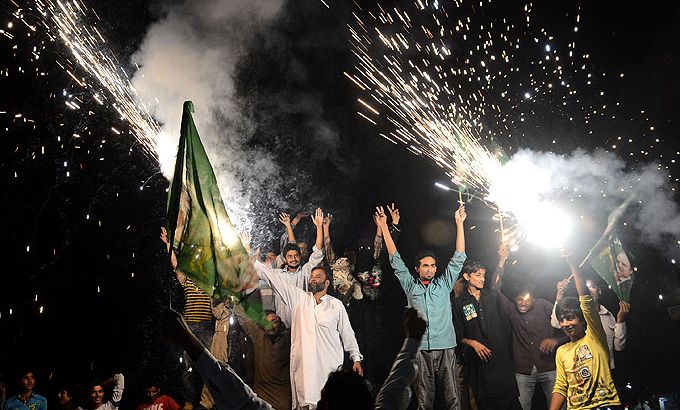Nawaz Sharif poised to return as Pakistan PM
Leader deposed in 1999 coup “holding talks” to form new government after his party’s strong showing in election.

Nawaz Sharif, winner of the Pakistani elections, is holding talks to form a new government, with fixing the economy and tackling the armed insurgency likely to be his two biggest challenges.
Partial, unofficial results from Saturday’s elections represented a comeback for Sharif, 63, who was deposed as prime minister in a 1999 military coup and spent years in jail and exile.
Sartaj Aziz, a senior PML-N official and former cabinet minister, said Sharif was in talks on Sunday with some independent MPs to get them on board and in discussions to work out “a few key portfolios” in the cabinet.
TV projections suggested no single party would win an absolute majority in the 342-seat National Assembly.
But Sharif’s centre-right Pakistan Muslim League-N (PML-N) was well ahead with more than 115 of the chamber’s 272 directly elected seats, according to various projections by private channels and as many as 128 according to Geo TV.
PML-N appears to have done well enough to rule out the prospect of a weak coalition, as the party of former cricket star Imran Khan achieved its own breakthrough on an anti-corruption platform that resonated with younger voters.
Imran Khan’s breakthrough
Khan’s Pakistan Tehreek-e-Insaf (PTI) was neck and neck with the outgoing Pakistan People’s Party (PPP) on about 30 to 25 seats, a remarkable achievement given that it only won one seat previously, in 2002.
Besides the National Assembly, voters also elected four provincial assemblies and Khan’s party emerged on top in Khyber Pakhtunkhwa, where he has pledged to end the US drone attacks.
The Bhutto clan’s PPP, which led the outgoing coalition, was heavily defeated over its record of ineffectual administration over the past five years.
Pakistani Taliban attacks marred the election campaign, with violence killing more than 150 people, including 24 on polling day itself.
In the latest incident, six people were killed and more than 40 wounded in Quetta, in Balochistan, when a suicide bomber targeted a police building late on Sunday.
Earlier, Pakistan’s largest domestic observer mission, The Free and Fair Election Network, said that the polls were “relatively fair” despite some irregularities and violence at the polling stations.
Flanked by his brother and daughter, Sharif gave a victory speech late on Saturday to hundreds of jubilant supporters at PML-N headquarters in Lahore.
“We should thank Allah that he has given PML-N another chance to serve you and Pakistan,” he said, after nearly 60 percent of the 86 million electorate.
“I appeal for all parties to come to the table and sit with me and solve the country’s problems.”
It remains unclear whether Sharif will preside over any substantive policy change in the war on anti-government fighters.
While he has voiced support for peace talks with the Taliban, he has been less vocal against the US drone strikes than his main rival Khan, and is considered a pragmatist with whom the US can work.
Neighbours’ reactions
Manmohan Singh, India’s prime minister, congratulated Sharif on Sunday on his “emphatic victory” and wrote on his official Twitter page that he hoped to chart “a new course for the relationship” between the neighbours.
Hamid Karzai, Afghan president, called on Sharif’s incoming government to help negotiate an end to the Taliban insurgency that has ravaged his country since 2001. Pakistan suffers from its own home-grown Taliban insurgency.
Pakistan, which has had three coups and four military rulers, is marking the first time that one elected civilian administration will hand power to another after a full term in office.
The election was defined by the collapsing economy, an energy crisis that causes power cuts of up to 20 hours a day, the unpopular alliance in the US-led “war on terror” and chronic corruption.
Sharif has pledged a pro-business agenda to revive the feeble economy for what will be his third term as prime minister, a record in Pakistan, following two tenures in the 1990s.
Al Jazeera’s Osama Bin Javaid, reporting from Islamabad, said Sharif’s first challenge is to form a national government.
“This will allow him to go ahead with agenda that he has promised to his electorate,” he said.
Sharif has also indicated that he is ready and willing to work with the US.
“He is well positioned and has the depth and patience to deal not only with countries that border Pakistan” but also with the wider world, our correspondent said.